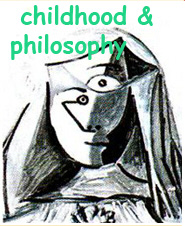“outfoxing nature”: matthew lipman and the prolegonema to a pedagogy of science
Abstract
This paper explores the role that the idea of science plays within Matthew Lipman’s approach to inquiry. On the one hand it seems that Lipman shares a typically modern ‘antagonist-metascientific’ view of philosophy (in a quasi Arendtian-Kantian way) in opposing the scientific undertaking and philosophical inquiry. On the other hand, he models his idea of community of philosophical inquiry on the Peircean-Deweyan theoretical construct of community of inquiry which refers exactly to the scientific undertaking. And – what is still more significant – it is just by capitalizing on the “scientific” origin of the construct that Lipman can revive the Socratic tradition of philosophy as a dialogic practice. But Lipman’s relationship with science is still more complex: he identifies science as a project of “outfoxing and outguessing nature.” By tracing the origin of such metaphors to the Heraclitean dictum “nature loves to hide” (physis kryptesthai philei) and to Francis Bacon’s interpretation of ancient myths, and by contrasting them with the Kuhnian idea of normal science as puzzle-solving, it becomes clear that Lipman recognizes the “thoughtful”—that is, philosophical -- dimension of science, and the need for complex thinking within science itself as a basic dimension of its development. Against the backdrop of such analyses, the paper attempts to point to the possibility of a pedagogy of science in a Lipmanian vein. Key-words: Community of inquiry; pedagogy of science; Matthew Lipman; philosophical practice; Peircean-Deweyan inquiryDownloads
Download data is not yet available.
Downloads
Published
2011-06-26
How to Cite
OLIVERIO, Stefano. “outfoxing nature”: matthew lipman and the prolegonema to a pedagogy of science. childhood & philosophy, Rio de Janeiro, v. 7, n. 13, p. pp.141–160, 2011. Disponível em: https://www.e-publicacoes.uerj.br/childhood/article/view/20583. Acesso em: 4 may. 2025.
Issue
Section
articles




